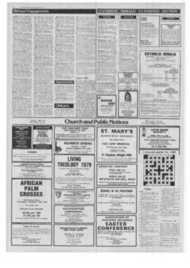Page 7, 30th March 1979
Page 7

Report an error
Noticed an error on this page?If you've noticed an error in this article please click here to report it.
Tags
Share
Related articles
Whitehouse Attacks Tv
Sir,—it Is Clear From Mr. Hope's Letter (february 11) On
New Curbs On Screen Violence To Be Launched
Pornography Today Is A Multi-billion Dollar Business:...
Parents Can Never Relax Their Vigilance
Two cheers for Mary Whitehouse
MARY WHITEHOUSE has made England less safe for pornography. She has spearheaded a brave attack on the nastier and Olinextremes of "permissive" sex and violence on the TV screen — extremes which are being too often and too easily taken for granted.
She deserves praise and gratitude, and it seems the reverse of grateful to "just hint a fault, and hesitate dislike". My two cheers, then, are lusty and prolonged. But somehow the third cheer sticks in my throat.
The crux of the matter is that I am sure we ought to aim to be critics, and not just censors; because censorship is the attempt to meet a complex problem with an over-simple solution.
It would be easy enough if we were dealing only with "mere entertainment". But we are not. Very often we are dealing with authentic products of creative Imagination, which Shelley called "the great instrument of moral good".
We are dealing, in fact, with art. And it is really no good applying criteria which, if used with logic and consistency, would exclude many of the Old Testament stories and about half of Shakespeare's plays; or attacking film directors like Ingmar Bergman or Luis Bunuel as if they were no better than Soho smut-hounds.
Let us be clear about this. Art has no rights against God; but it does have rights against an indiscriminate blasting-off in all directions by "clean up" campaigns and Festivals of Light. Attacks on art can too easily finish up as attacks on truth, beauty and intelligence.
All of this may sound a bit airy. fairy. There is of course a great deal of rubbish on TV, some of it rather nasty rubbish — though not particularly worse than what can be found in books, plays and films. But if the worst is terrible, the best is very good indeed.
Speaking personally for a moment, I came to "the box" only a few years ago and fairly late in life, having been deeply suspicious of it up to then.
I was amazed, not only by the quality of plays by Rudkin, Potter, Stoppard and many others, which are much better than most of what you can pay hefty prices to see in London's West End, but also by the basic seriousness and accurate social comment in popular series such as "Z Cars" or "Target", not to mention the delightful and intelligent humour of "The Good Life", "Reginald Perrin" and "All Creatures Great and Small".
When so much is offered which can aptly be called ideal family entertainment, it seems to me a bit ungrateful to complain about the transmission, rather later at night, of film, which one might certainly hesitate to hire on 16 mm for Reverend Mother's birthday treat.
I am not in business as a guardian of other people's morals, but if moral issues are in question, I would think that more harm is done by assumptions, by what is taken for granted, than by what is made explicit, or even over-explicit, in words or images (Det Inspr Hackett's very casual womanising is a case in point here — though I am not thinking only of sexual morality).
But I think we should face up to the unpalatable fact that Britain is not a Christian country, except in the vaguest and most minimal sense, and so we can hardly be surprised when plays or films fail to reflect a Christian moral view.
Furthermore, all television sets are fitted with a knob which switches them off. I am puzzled by the way Mrs Whitehouse talks almost as if we're in the wretched state of the citizens portrayed in Orwell's "Nineteen Eightyfour", who are forbidden to switch off the television on pain of imprisonment and torture.
No, we are free at any time to turn the darned thing off and to do Instead something wildly original and eccentric like reading a book or going outside to look at the night sky.
What it is practically impossible to get away from is the constant and much more insidious pressure of advertising which takes for granted that we are all tremendously keen on getting as much luxury, worldly possessions and pleasures as we can possibly afford. I can never understand why this sort of thing is supposed to be less at variance with the Gospel than violent or sexual images.
Summing up, briefly, moral indignation can be just a little too easy — easier, for example, than trying to exercise some sensible authority and supervision over children's television viewing. And as a weapon, it is too much of the "blunderbuss" variety.
Critical discrimination — the attempt to decide what is essentially true and good — is much more difficult. But I wish that Mrs Whitehouse and her supporters would make a little more effort in that direction; because I am sure that their attacks on what really needs attacking would then be a lot more effective.
blog comments powered by Disqus











